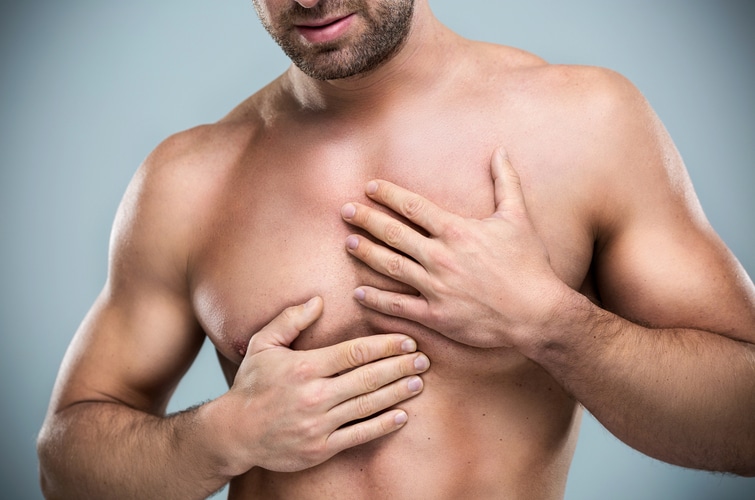It is disappointing to exert all efforts at losing extra weight just to be recovered on one particular occasion. It's only natural for a person to ask oneself if those pounds will ever be shed. But never give up and discard your diet straight off.
As with everyone hitting the track, it is tough to recognize where to pay attention and allocate efforts. Is it better to curb or improve lean muscle? Most people, not just you, are skeptical if they must lift weights at the gym or perform more cardio exercise.
When you're trying to lose weight, focusing only on one goal of shedding those pounds isn't entirely wrong. The more you concentrate, the higher the tendency that you'll follow your plan, even when something stops you. And that will enable you to achieve the goal of your fitness journey. However, as you consider immediate goal can help you lose weight, it can also get challenging to maintain the obtained figure, which is a more significant problem.
Often, weight loss rates decline when people become thinner. Because muscle is denser than fat, gaining muscle might cause gain weight. It's much easier and faster to get noticeable results from gaining weight than weight loss.
This article will address which you should prioritize first, weight loss or gain weight (and building muscle), and the big difference between them. We'll provide here some tips to maximize whichever goal you intend to achieve.
Contents
Is It Easier To Lose Or Gain Weight?
Evidence reveals that people can reduce weight forthright on virtually any diet. The case is that almost all individuals gain it back in the long run. And that most people fatten up in just 2–5 years.
Studies also show that instead of having long-term weight loss, dieting among people who are not overweight is connected with a heightened risk of growing fat eventually. After dieting, we are likely to offset the hunger we've tolerated by eating more, so the weight gain.
Why Is It So Harder To Lose Weight?
One critical method of losing weight is to burn more calories than you consume. However, it's not practically about making some time to work the body or choosing good food over fast food - it's about making a daily meaningful engagement with your health despite the changes.
Here are some common reasons why you're not losing weight.
Your Diet
Changing how you eat is a must for stable weight loss. That implies striving to trade unhealthy foods with healthier options and achieving that as a rule. Below are some possible diet roadblocks:
-
Not calorie deficit - Studies continuously illustrate that people misjudge their calorie intake by a considerable amount. Give more importance to the quality, not the quantity. Try tracking your calories using online calculators like Precision Nutrition to determine how many calories to consume for a moment.
-
Not eating whole foods - Consuming whole foods can help control your appetite and condition your overall health. Eating processed foods presented a high caloric intake and weight gain results.
-
Not enough protein - Protein can stimulate metabolism and naturally dissolve several hundred calories every day. Protein-rich foods restrain carbohydrate cravings and help you feel fuller for longer.
-
Eating too much - Some may overeat on highly processed foods, whereas others overeat on somewhat healthy foods. The fundamental principle of "fewer calories in, more calories out" remains valid; even if something is considered "healthy," its calories still count.
-
Not drinking enough water - The litres of water you drink can impact the heaviness you drop- coupled with all else.
You can still revel in your favourite foods, but not every day. Even if you modify one thing at once, discover how you can reduce your eating portion.
Not Monitoring What You’re Eating
For lasting weight loss, you must take note of what you consume and make wise decisions most of the time. You, like most people, tend to praise yourself for having a salad one day while ignoring that you had two bowls of ice cream for dessert.
Research reveals that people who keep food journals to track their food intake lose more weight than individuals who don't.
Healthy eating never stops.
Not Exercising Consistently
If you are not consistent with your workout, it isn't easy to lose weight. Once your body adjusts to your routine, you must modify it to keep it engaged. If you miss so many exercises, it's nearly like starting from zero each time.
You don't have to work out for hours; you just have to establish a practical exercise timetable that you can follow weekly. You must be eager to be more involved regularly — not only for a week.
Not Lifting Weights
When it comes to losing weight, the most suitable form of exercise you can do technically is strength training, particularly weight training. It helps you maintain muscle mass, which is usually burned, including body fat, if you're not doing physical activity.
Furthermore, lifting weights can help prevent metabolic delays and ensure your body remains fit and healthy. But if you prefer running rather than lifting, proceed to that.

Not Getting Enough Sleep
When you're not sleeping well, it can become more challenging to lose weight. Some studies have revealed that lack of sleep could impact your metabolism by making you feel hungry, although you're not.
You may also find it hard to exercise because of low energy when you don't get enough sleep.
You're more likely to make wrong diet decisions when you're weary. In the latest study, individuals who have not been sleeping well consume roughly 300 more calories each day than those with more rest.
Physiological Reasons
Fat Cells Never Leave
According to scientists, fat cells or adipocytes never really go away. When someone begins losing weight, the cells shrink.
When you gain weight, the adipocytes regain its size to hold the excess fat. You can break up the fat inside but not the cells themselves.
Each adipocyte has tiny sensors that signal your brain when fat is burned to replenish them. Your brain switches on the hunger core to locate some calories to fill up the lost body fat. If you have more adipocytes, the signals are more powerful to substitute the fat within the cells, and the more extreme your hunger and cravings will be.
Hormones Change
It appears from puberty until we die, we're affected by our hormones.
If you're like most women, your weight may swell during menopause. Fluctuations in hormones and lack of sleep from hot flashes can bring more pounds. For both men and women, a reduction in testosterone means a drop in muscle mass, slowing down the body's metabolic rate and causing weight gain.
Certain health conditions can prompt weight gain and make it more challenging to lose weight. These include sleep apnea, hypothyroidism, and polycystic ovarian syndrome (PCOS).
The change in fat storage also may cause weight gain more prominent and raise the risk of type 2 diabetes, high cholesterol, high blood pressure, and heart disease.
Your Metabolic Rate Slows
Metabolism is partially genetic and mainly beyond one's control. Perhaps, you do not have adequate lean muscle mass. A lean, muscular person burns extra calories compared to an individual with a higher percentage of body fat.
Some medications induce weight gain or hinder your weight loss efforts. For instance, steroids can affect your metabolism and increase your appetite. Thus, you may overeat and gain abdominal fat.
A person with a low metabolism will burn fewer calories, even during activity, leading to weight regain.
Which Is Harder, To Gain Muscle Or Weight Loss?
Losing weight and gaining muscle are closely connected. When you lose fat and shed pounds, you facilitate your metabolism and have the energy to face more strenuous workouts and, in response, gain muscle. However, many factors oppose each other; for instance, you need to consume fewer calories to lose weight, and building muscle demands increasing your protein consumption. You should concede that every goal requires various methods.
It's easier for most people to build muscle versus lose an apparent amount of fat. Muscle has a greater density than fat. Hence, fat tissue disperses and occupies more room than muscle tissue. But an obese will lose weight more carefree than someone with less body fat.
And if you bear a lower body fat percentage, gaining more muscle mass may be more manageable before losing weight.

How To Optimize Weight Loss
Losing body weight can be formidable, usually needing effort, patience, and commitment.
It could be you're planning to reduce some pounds to feel better, or perhaps you're attempting to make weight for an event or like to step on stage as slim as doable. Whatever your final goal is, there are many ways to maximize your weight loss efforts.
Although there are numerous diets, supplements, and meal replacement programs assuring rapid weight loss, most lack any scientific proof.
Here are three of the best practices to boost fat loss.
Follow A Strict, Yet Balanced Diet
You'll train yourself to eat healthily when you observe strict diet meal programs.
Eating the right amount of calories and choosing fruits and vegetables rather than fatty, processed food will help speed up weight loss. Reducing sugar is another typical method, like drinking fruit juices and soft drinks.
Diets with whole grains are linked to a lower body mass index (BMI), body weight, and a tinier waist circumference. Additionally, consuming protein-rich foods prevents muscle loss and maintains a boosted metabolism.
Get More Sleep
Going to sleep a little early or setting the alarm a bit later is a simple way to help you achieve and sustain a healthy weight. Remember to sleep in a dark room and don't eat right before bed.
Exercise Daily
Cardiovascular exercise, or cardio or aerobic exercise, is any exercise that raises your heart rate. It incorporates weight training, jump rope, jogging, swimming, and cycling.
It is one of the most practical methods to improve your health. It is also highly efficient at burning calories and losing fat, the unhealthy hidden fat that spreads around your organs and causes illness. Several studies recommend that at least 30 minutes of everyday fitness is helpful for weight maintenance.
Exercise is more than just visiting the gym. Continuously seize the chance to burn fat!
How To Optimize Muscle Gain
Gaining weight needs physical training and specific dietary components for the best outcomes. There's some similarity between doing the things that make it more effortless to lose weight and easier to gain weight.
You can lose weight and build muscle at once, but it's more demanding and requires more dedication than just carrying out one or the other.
Some studies have confirmed that consuming a high-protein meal may aid muscle gain and weight loss. Also, you can do a few things at the gym to help you burn calories and build muscle.
Below are other suggestions for gaining muscle:
Strength Training
Do some higher-intensity workouts that centre on building strength. Heavy training provokes the muscles not only coordinately but also eccentrically. Lifting weights enough times forces your muscles to rip and break up. And when it rebuilds itself after the exercise, it'll be larger and firmer.
Drink Water
Bodybuilding causes water loss due to sweating, which can compromise muscle recovery and fail to improve your muscle mass. Drinking water hampers dehydration and hunger because an empty stomach can make you believe you're starving.
Eat Protein
You need the right nutrition to fuel your body and build and maintain muscle. Prioritize a protein-rich diet during caloric restriction, especially lean protein, roughly 1 gram for every pound of your weight.
Key Factor To Lose Weight And Gain Muscle: Consistency

To achieve your weight and muscle goals, be consistent. Regardless if your plan isn't perfect – just doing something will matter. You'll notice more remarkable outcomes if you stay consistent even with your lapses and choose to be considerate with your body.
The Bottom Line
Not everyone will witness developments instantly because body weight is strongly influenced by a person's genes, the intensity of physical exercise, and food preferences.
For most people, losing weight is more demanding than gaining muscle, but you must still emphasize fat loss before attempting to gain muscle. Not achieving your weight loss objective can happen at the primary level when calorie intake is on a par with or more than calorie use.
But several aspects can affect the hardship of losing fat or gaining muscle. Thus, you should understand them to develop sensible goals and define what hinders your weight loss efforts and results.
Try techniques like cardio exercises, weight lifting, eating a balanced diet, tracking what you eat, and getting enough sleep. After all, improving your weight and lifestyle needs patience, commitment, determination, and flexibility.






